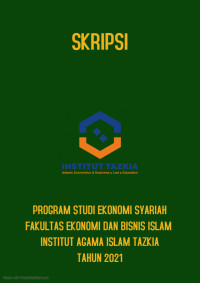Electronic Resource
Assessing The Islamic Bank Financing During Economic Recession:The Role Of Stimulus Regulation Pojk Number 11/Pojk03/2020
Purpose: This study aims to assess the Islamic bank financing in the time of
economic recession. This study discusses the role of the stimulus regulation in
influencing the total financing of Islamic banks in Indonesia. Furthermore, to
examine the procyclicality behavior of Islamic banking financing on the business
cycle.
Design/Methodology: This research uses a quantitative approach with panel data
analysis method. With case studies on 12 Islamic Commercial Banks with a time
period from quarter 1-2017 to quarter 1-2021. The data used in this study uses
secondary data, where the data sources are obtained from various sources. The data
is then processed using the software Eviews 11.
Findings: The result show that there was no significant change in total financing
of Islamic bank in Indonesia in the period before and after the economic recession
due to the pandemic. The financing restructuring variable has a positive and
significant effect on the distribution of total bank financing. This shows that the
stimulus regulation does not prevent banks from continuing to channel financing to
the public. Furthermore, this study found that during the study period, Islamic banks
did not show pro-cyclical behavior towards the business cycle that could exacerbate
fluctuations.
Suggestion: In this study it was found that the stimulus policy has been quite
effective in accelerating Islamic banking financing during the period of economic
recession. However, other alternative instruments must be prepared for future use,
given that the economy will continue to fluctuate. Then, regulations related to
internal sharia banking must be paid more attention to by regulators.
Limitation: This study only focuses on examining the financing activities of 12
Islamic Commercial Banks in Indonesia in the period before and after the economic
recession.
Availability
Detail Information
- Series Title
-
-
- Call Number
-
REF 332 RIA a
- Publisher
- Bogor : STEI TAZKIA., 2021
- Collation
-
ES
- Language
-
English
- ISBN/ISSN
-
NIM.17103019
- Classification
-
332
- Content Type
-
-
- Media Type
-
-
- Carrier Type
-
-
- Edition
-
-
- Subject(s)
- Specific Detail Info
-
-
- Statement of Responsibility
-
Ririn Riani
Other version/related
No other version available
File Attachment
Comments
You must be logged in to post a comment

 Computer Science, Information & General Works
Computer Science, Information & General Works  Philosophy & Psychology
Philosophy & Psychology  Religion
Religion  Social Sciences
Social Sciences  Language
Language  Pure Science
Pure Science  Applied Sciences
Applied Sciences  Art & Recreation
Art & Recreation  Literature
Literature  History & Geography
History & Geography